

Literacy Lowdown- Assessing in a Remote Setting. Maureen Hayes, PreK-6 Humanities Supervisor This Month's Focus: Assessment in a Remote Setting How Do You Reflect Student Learning?
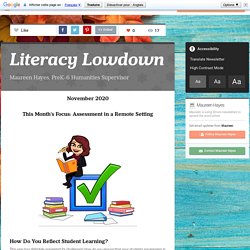
This year has definitely presented it's challenges! How do you ensure that your students are learning in in our remote/hybrid world? What are the best ways to assess student learning? 1. As you would in person, give feedback and feedforward; help students set goals and monitor their own progress towards meeting them. This small group and one-on-one time has never been more important to get a solid understanding of student progress. 2. Each idea below is linked to more information for using the tool for virtual assessment. Recommended books for staff... Literacy Lowdown- Dyslexia Awareness Month. Maureen Hayes, PreK-6 Humanities Supervisor This Month's Focus: Dyslexia October is Dyslexia Awareness Month!
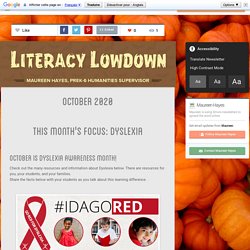
Check out the many resources and information about Dyslexia below. There are resources for you, your students, and your families. Literacy Lowdown- Hispanic Heritage Month. Literacy Lowdown- Writing Instruction to Meet the Needs of All Students. Literacy Lowdown- Taking Your Students' Learning Beyond the Four Walls of Your Classroom. Literacy Lowdown- Teaching With a Trauma-Sensitive Lens. Literacy Lowdown- Summer Reading. Literacy Lowdown- Word Study Activities. Maureen Hayes, PreK-6 Humanities Supervisor This Month's Focus: Meaningful Word Study Activities In my January/February Smore, I shared information for supporting word study and phonics development in your classroom.
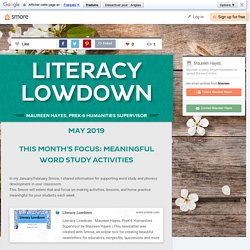
This Smore will extent that and focus on making activities, lessons, and home practice meaningful for your students each week. When we know better, we do better... Word Study is about understanding patterns in words, and being able to apply these patterns to spell and read unknown words. Even if a student does manage to memorize the spelling of words to be successful on an assessment, the research shows no connection to long-term memory and carry-over into student writing. Asking a student to write a word as practice is only useful if students attach meaning to what they’re writing. For that reason, the following activities should NOT be part of your repertoire for word study practice or instruction. 1. 2. 3. 4. 5.
Source: source: Gross Motor Activities. Literacy Lowdown- Empowering Students on Their Journey as Readers. Literacy Lowdown- Engaging Reluctant Readers. Maureen Hayes, PreK-6 Humanities Supervisor This Month's Focus: Engaging Reluctant Readers How do you ensure that you are reaching even your most reluctant readers?
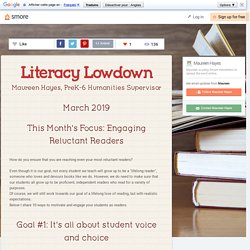
Even though it is our goal, not every student we teach will grow up to be a "lifelong reader", someone who loves and devours books like we do. However, we do need to make sure that our students all grow up to be proficient, independent readers who read for a variety of purposes. Of course, we will still work towards our goal of a lifelong love of reading, but with realistic expectations. Literacy Lowdown- Word Study. Literacy Lowdown- Student Engagement & Self-Care. Literacy Lowdown- Genius Hour. Maureen Hayes, PreK-6 Humanities Supervisor This month's focus: Genius Hour "With Genius Hour, students own the entire journey" John Spencer Genius Hour, also known as 20% time, is a time when students get to explore their own interests or passions.
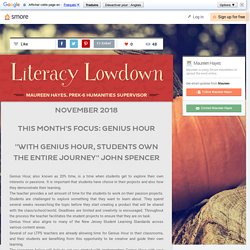
It is important that students have choice in their projects and also how they demonstrate their learning. The teacher provides a set amount of time for the students to work on their passion projects. Genius Hour also aligns to many of the New Jersey Student Learning Standards across various content areas. Several of our LTPS teachers are already allowing time for Genius Hour in their classrooms, and their students are benefiting from this opportunity to be creative and guide their own learning. The resources below will help to get you started with implementing Genius Hour with your students, or supporting you if you are already doing this in your classroom.
John Spencer has great resources for Genius Hour. . #7: Genius Hour creates a culture of joy. Literacy Lowdown- Culturally Responsive Literature. Literacy Lowdown- Getting to Know Your Students. Maureen Hayes, PreK-6 Humanities Supervisor This month's focus: Getting to Know Your Students Let's go beyond traditional ice-breakers...how are you REALLY getting to know your students?
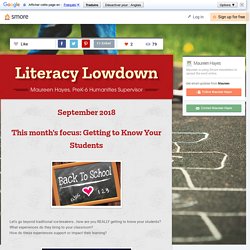
What experiences do they bring to your classroom? How do these experiences support or impact their learning? Don't touch the curriculum during the first days of school I know this sounds strange coming from the curriculum supervisor. The first few weeks of school should be spent establishing relationships and a classroom enviroment where student voice and choice is not only welcome, but expected. If students do not feel safe and accepted, learning is negatively impacted. All of our K-6 classrooms at LTPS should be implementing a Responsive Classroom, and this is the time to utilize The First Six Weeks of Schools to guide this process.
It's all about relationships! If a student does not feel welcome, safe, and a part of your classroom, this can greatly impact their learning. Literacy Lowdown- Small Shifts in Goal Setting. Maureen Hayes, PreK-6 Humanities Supervisor This month's focus: Small Shifts in Goal Setting What will you shift for next year to move you and your students forward?
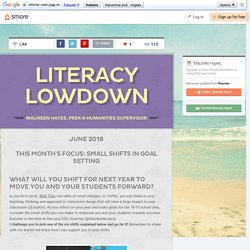
In Joy Kirr's book, Shift This, she talks of small changes, or "shifts", you can make in your teaching, thinking, and approach to classroom design that will have a large impact in your classroom (@JoyKirr). As you reflect on your year and make goals for the 18-19 school year, consider the small shifts you can make to empower you and your students towards success.
Summer is the time to flex your EDU muscles (@SteinbrinkLaura). I challenge you to pick one of the six shifts explained below and go for it! Literacy Lowdown- Tech Tools to Enhance Your ELA Classroom. Literacy Lowdown- Feedback. Literacy Lowdown- Culturally Responsive Literature. Literacy Lowdown- How Do You PD? Maureen Hayes, PreK-6 Humanities Supervisor This month's focus- How do you PD?
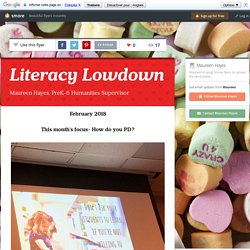
As educators, we expect our students to continually be learning and developing their knowledge base. What are you doing to continue your own growth and development? You expect continued, sustained learning from your students...do you expect this from yourself as well? We are all very busy living our lives, and sometimes our own learning takes a backseat to the demands of everyday life. Great Blog! You can listen to podcasts on your laptop, tablet or smart phone.
If you have an iphone, the podcast app should already be there (pictured above in purple). Once you have it, just go in and search for podcasts that interest you and start to listen. The article below lists some of the more popular educational podcasts, and many of them are in my podcast library. My favorites so far...and I'm still discovering...and yes I realize they are the first three highlighted in the article above (because they really are good!). Literacy Lowdown-Inspiring Yourself and Your Students for 2018. Maureen Hayes, PreK-6 Humanities Supervisor This Month's Focus- Inspiring Yourself and Your Students for 2018 What are you going to do to make 2018 the best year ever for your students?
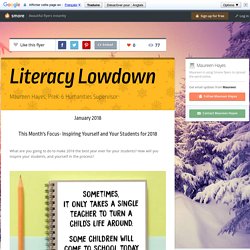
How will you inspire your students, and yourself in the process? Literacy Lowdown- Conferring With Students. Maureen Hayes, PreK-6 Humanities Supervisor This Month's Focus- Conferring With Students Individual students conferences are the heart of your teaching.
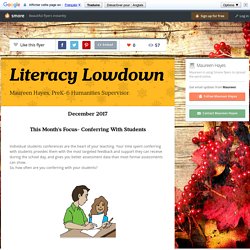
Your time spent conferring with students provides them with the most targeted feedback and support they can receive during the school day, and gives you better assessment data than most formal assessments can show. Literacy Lowdown- Vocabulary. Literacy Lowdown- The Three Ds: Dyslexia, Dysgraphia & Dyscalculia. Maureen Hayes, PreK-6 Humanities Supervisor This Month's Focus: The Three Ds- Dyslexia, Dysgraphia, Dyscalculia October 2-6, 2017 is Dyslexia Awareness Week Below is information to help you better understand the differences between Dyslexia, Dysgraphia, and Dyscalculia. We will delve into these further at this year's meetings, looking closely at characteristics of and classroom modifications to support students who show signs of any of these learning differences. Not all students who show signs of or are diagnosed with Dyslexia, Dysgraphia, or Dyscalculia need to be referred or receive special education.
Literacy Lowdown- Literacy Diversity & World Language Reinforcement. Literacy Lowdown- Reflecting on Your School Year. Literacy Lowdown- Student Engagement. Literacy Lowdown- Questioning. Literacy Lowdown- Independent Reading. Maureen Hayes, PreK-6 Humanities Supervisor This month's focus- Independent Reading Now, I'm not talking here about SSR or DEAR time, where the teacher reads along with the students to model and show his or her love of reading. I'm talking about reading for enjoyment, but also with a purpose, where the teacher's job is to support his or her readers through small group and independent instruction.
"A child sitting in a quiet room with a good book isn't a flashy or marketable teaching method. It just happens to be the only way anyone became a reader. " Donalyn Miller Talks About Independent Reading: Choosing Books for Independent Reading Picking a "just right book" does not mean holding a child to a specific level or genre. VOICE and CHOICE in independent reading selections is essential. Literacy Lowdown- Student Independence & Accountability During Reading Workshop. Literacy Lowdown- Close Reading. Maureen Hayes, PreK-6 Humanities Supervisor This month's focus- Close Reading Also included #OneWord2017 and a 2017 picture book preview Close Reading Close reading is thoughtful, critical analysis of a text that focuses on significant details or patterns in order to develop a deep, precise understanding of the text's form, craft, meanings, etc. It is a key requirement of the Common Core State Standards and directs the reader's attention to the text itself.
Check out my Pearltrees Close Reading folder below for more resources: Closing In On Close Reading.